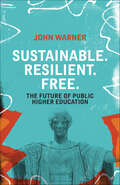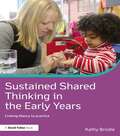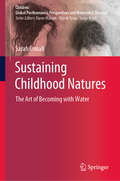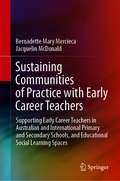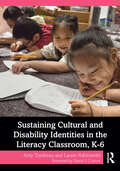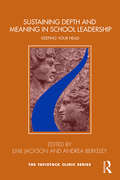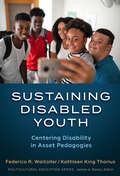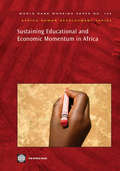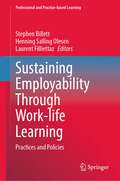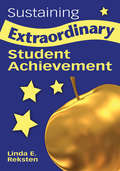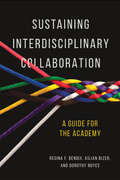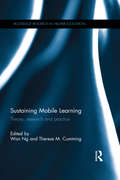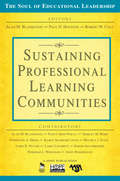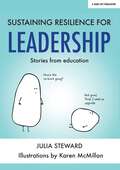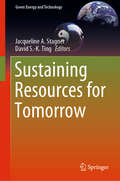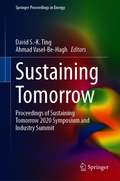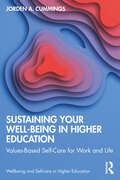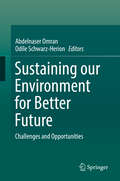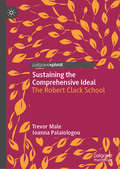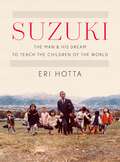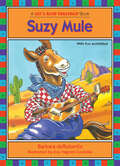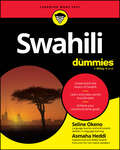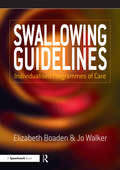- Table View
- List View
Sustainable. Resilient. Free.: The Future of Public Higher Education
by John WarnerAfter the coronavirus pandemic has laid bare the unsustainability of our public higher education system, an author and educator maps out a path for change. In 1983, U.S. News and World Report started to rank colleges and universities, throwing them into competition with each other for students and precious resources. Over the course of the next thirty or so years, a Reagan-era ethos of privatization and competition transformed students into consumers and colleges into businesses. Now, tuition is unaffordable. Student loan debt is more than $1.6 trillion, and most college faculty work in adjunct positions for low pay and with no job security. Colleges seem to exist only to enroll students, collect tuition, and hold classes. When learning happens, it is in spite of the system, not because of it. In Sustainable. Resilient. Free., John Warner envisions a future in which our public colleges and universities are reoriented around enhancing the intellectual, social, and economic potentials of students while providing broad-based benefits to the community at large. As Warner explains, it&’s not even all that complicated. It&’s no more costly than the current system. We just have to choose to live the values we claim to hold dear. A critical read for anyone invested in the future of public higher education.
Sustained Shared Thinking in the Early Years: Linking theory to practice
by Kathy BrodieUsed as a measure of quality in the ground-breaking Effective Provision of Pre-School Education (EPPE) project, Sustained Shared Thinking is fundamental to good early years practice. It costs nothing, yet research has shown that it improves outcomes for children by supporting their holistic development. This book clearly explains what Sustained Shared Thinking is and examines the skills and expertise needed to initiate, encourage and facilitate it. The book explores the attitudes, knowledge and understanding that a practitioner must adopt in order to start or develop successful Sustained Shared Thinking. Combining theory with practical guidance, it demonstrates how it can be achieved, covering all aspects of early years practice including the Characteristics of Effective Learning, the Prime and Specific Areas of learning development, the role of the practitioner, the environment and working with parents. Features include: boxed links to key theory and research; practical strategies highlighted in the text; consideration of children at different ages and stages of development; links throughout to the Early Years Foundation Stage. Written by a leading consultant who regularly delivers training on Sustained Shared Thinking, this will be an essential text for students on foundation degree and childhood studies courses as well as early years practitioners.
Sustaining Childhood Natures: The Art of Becoming with Water (Children: Global Posthumanist Perspectives and Materialist Theories)
by Sarah CrinallThis book examines sustainability learning with children, art and water in the new material, posthuman turn. A query into how we might sustain (our) childhood natures, the spaces between bodies and places are examined ontologically in daily conversations. Regarding philosophy, art, water and her children, the author asks, how can I sustain waterways if I am not sustaining myself?Theoretically disruptive and playful, the book introduces a new philosophy that combines existing philosophies of the new material and posthuman kind. The ecological sciences, and the arts, are drawn together / apart to help recognize sustainability in its emergent, relational form. All the while this book, as art, engages and flows over the reader – as such, reading it becomes a transformative, meditative experience. Daily rhythms of ‘being-with’ art, water and children take the reader beyond orientations of environmental education that focus on notions of lack and reduction. New possibilities for sustaining childhood natures – for what is becoming, and unbecoming – emerge here in the making processes of an academic, everyday life in early motherhood.
Sustaining Communities of Practice with Early Career Teachers: Supporting Early Career Teachers in Australian and International Primary and Secondary Schools, and Educational Social Learning Spaces
by Bernadette Mary Mercieca Jacquelin McDonaldThis book focuses on sustaining communities of practice in primary and secondary schools in Australia and internationally for the professional learning of all teachers, and particularly, early career teachers. Informed by the communities of practice research of Wenger-Trayner, it shows what factors are conductive to the sustainability of communities of practice, drawing particularly on a case study of an Australian regional secondary school, and explores how it has sustained support particularly for early career teachers over a three-year period.The first chapters of the book provide longitudinal perspectives using qualitative data and include perspectives from a variety of stakeholders, including the principal, the professional learning coordinator and the early career teachers who have experienced the school’s Communities of practice over three or more years. It offers practical suggestions on how to implement and improve communities of practice in schools and highlights the increasing importance of online communities to support early career teachers. Policy-makers, school principals, teacher educators and teaching practitioners find the book useful for implementing and sustaining communities of practice in schools.Subsequent chapters explore the value of online communities, such as Twitter communities; the role of collegial support networks in supporting early career teachers in Flemish primary education; and professional learning in Northern Ireland pre- and in-service teacher networked communities.
Sustaining Cultural and Disability Identities in the Literacy Classroom, K-6
by Amy Tondreau Laurie RabinowitzIdeal for literacy methods and elementary instruction courses, this book brings together three strands of educational practice—Culturally Sustaining Pedagogy (CSP), Disability Sustaining Pedagogy (DSP), and balanced literacy—to present a cohesive, comprehensive framework for literacy instruction that meets the needs of all learners. Situating balanced literacy instruction within the current debate on how to best teach elementary school literacy, this book prepares pre-service and in-service teachers to work with racially, ethnically, and linguistically diverse students of all abilities and disabilities and addresses effective curriculum design, lesson planning, and assessment. Chapters offer real-world classroom examples and lesson plans, charts, and discussion guides for CSP/DSP-infused instruction for each component of a balanced literacy instructional block.
Sustaining Depth and Meaning in School Leadership: Keeping Your Head (Tavistock Clinic Series)
by Emil JacksonSustaining Depth and Meaning in School Leadership: Keeping Your Head concerns the emotional and psychological experience of school leadership—in particular, the felt experience of life as a headteacher. It describes the pressures and rewards of the role, together with some of the ways that school leaders successfully sustain and develop themselves and their teams in what has become an increasingly complex, challenging, and highly accountable role. This book explores the personal experience of leading schools. Part I provides an overview and analysis of current and historical trends in school leadership and offers some theoretical frameworks for making sense of these. Part II then offers psychodynamic approaches to supporting and developing school leaders and the impact that trends in executive education continue to have on this. Part III looks at approaches to school leadership development more generally, including team development; influences from the business world; the growth of mentoring and coaching as a leadership intervention; the design and evaluation of leadership development programmes; and a case study on whole-system development. The final word is given to ten serving headteachers and deputies and their leadership journeys. This range of chapters, concepts, and perspectives will support school leaders to maintain an emotional equilibrium while navigating the multilayered tightrope of intrapsychic, interpersonal, and organizational dynamics inherent in school life. Rooted in Jackson and Berkeley’s belief that school leaders are likely to be at their best when they find their own unique and authentic way of taking up their leadership role, this book is an accessible, supportive, and developmental contribution for all those involved in education leadership.
Sustaining Disabled Youth: Centering Disability in Asset Pedagogies (Multicultural Education Series)
by Frederico R. Waitoller Kathleen A. King ThoriusAsset-based pedagogies, such as culturally relevant/sustaining teaching, are frequently used to improve the educational experiences of students of color and to challenge the White curriculum that has historically informed school practices. Yet asset-based pedagogies have evaded important aspects of students’ culture and identity: those related to disability. <P><P> Sustaining Disabled Youth is the first book to accomplish this. It brings together a collection of work that situates disability as a key aspect of children and youth’s cultural identity construction. It explores how disability intersects with other markers of difference to create unique cultural repertoires to be valued, sustained, and utilized for learning. <P><P>Readers will hear from prominent and emerging scholars and activists in disability studies who engage with the following questions: Can disability be considered an identity and culture in the same ways that race and ethnicity are? How can disability be incorporated to develop and sustain asset-based pedagogies that attend to intersecting forms of marginalization? How can disability serve in inquiries on the use of asset-based pedagogies? Do all disability identities and embodiments merit sustaining? How can disability justice be incorporated into other efforts toward social justice?
Sustaining Educational and Economic Momentum in Africa
by The World BankForty-four African ministers of finance and of education from 28 countries met in Tunis at a July 2009 conference on "Sustaining the Education and Economic Momentum in Africa amidst the Current Global Financial Crisis." The conference attendees discussed why and how they must exercise joint political leadership during the current global economic crisis to protect the educational development achieved during the past decade. They acknowledged that educational reform is an agenda for the entire government and that strong leadership to foster cross-ministry collaboration, coordination, and mutual accountability is required to ensure that education and training investments are effective in advancing national development and economic progress.
Sustaining Employability Through Work-life Learning: Practices and Policies (Professional and Practice-based Learning #35)
by Stephen Billett Laurent Filliettaz Henning Salling OlesenThis book seeks to advance understandings of and approaches to supporting and sustaining working age adults’ learning across lengthening working lives and inevitable transitions they encounter and are required to negotiate. It is founded on the processes and findings of a three-phase practical inquiry into worklife learning and its implications for workplace and educations’ practice conducted in Australia over a three-year period commencing in 2019. Diverse perspectives and orientations were utilised in approaches to data analysis and renderings from the data, thereby opening up the analysis of these complex phenomena to different lines of interrogation, questions and analytical approaches. It elaborates more fully understandings about the processes of adults’ learning and development across their lifespan of adulthood referred to as working life, and what factors and contributions supported that learning. This book also attempts to reconcile a coherent view about development across the work lifespan, and how that can be supported by education provisions, workplaces, communities, and by the adults themselves.
Sustaining Extraordinary Student Achievement
by Linda E. RekstenThe author examines five Title I schools that overcame significant challenges to sustain student achievement and presents principles for building a culture of high standards and expectations.
Sustaining Interdisciplinary Collaboration: A Guide for the Academy
by Kilian Bizer Dorothy Noyes Regina BendixAt once a slogan and a vision for future scholarship, interdisciplinarity promises to break through barriers to address today's complex challenges. Yet even high-stakes projects often falter, undone by poor communication, strong feelings, bureaucratic frameworks, and contradictory incentives. This new book shows newcomers and veteran researchers how to craft associations that will lead to rich mutual learning under inevitably tricky conditions. Strikingly candid and always grounded, the authors draw a wealth of profound, practical lessons from an in-depth case study of a multiyear funded project on cultural property. Examining the social dynamics of collaboration, they show readers how to anticipate sources of conflict, nurture trust, and jump-start thinking across disciplines. Researchers and institutions alike will learn to plan for each phase of a project life cycle, capturing insights and shepherding involvement along the way.
Sustaining Mobile Learning: Theory, research and practice (Routledge Research in Higher Education)
by Wan Ng Therese M. CummingMobile technologies are one of the fastest growing areas of technology in education. For learners, they offer an appealing opportunity to transcend teacher-defined knowledge and approaches by being able to access multiple, alternative sources of information anytime and anywhere. While the pace of engagement with and research into the educational applications of mobile technologies has picked up dramatically in the last decade, there is no consolidated view of how to sustain the practices or opportunities that are being explored. Sustainability is a complex but crucial issue in mobile learning as educational institutions are usually required to make substantial investments in mobile devices and associated technologies, time and training to initiate mobile learning programs. The complexity of sustainable mobile learning programs is further exacerbated by the fast pace of change of digital technologies, where with every change, new possibilities are opened up and investments required. In addition, educators are still attempting to reconcile institutions of formal education with informal mobile learning. The book addresses these issues, with a particular focus on: exploring the challenges surrounding the sustainability of mobile learning in K-12 and higher education investigating the importance of sustaining mobile learning for diverse populations of students globally discussing theoretical models for the sustainability of mobile learning providing the reader with strategies for sustaining mobile learning. Presenting new research alongside theoretical models and ideas for practice, the book will appeal to researchers, academics, and postgraduate students in the fields of education and mobile learning, as well as those working in teacher education.
Sustaining Professional Learning Communities
by Alan M. Blankstein Paul D. Houston Robert W. ColeFeaturing contributions from top educators, the third volume of The Soul of Educational Leadership series examines leadership and moral choices and offers strategies for supporting professional learning communities.
Sustaining Resilience in Leadership: Stories from Education
by Julia StewardAs a facilitator of a national leadership programme for experienced headteachers, Julia Steward noticed how frequently competent and apparently confident headteachers admitted to their fear of being 'found out'. Along with the fear of being found out, it seemed, was a twin fear of anyone finding out that they worried about being found out. The fear was compounded by a sense of isolation: each one imagined everyone else was feeling supremely confident. Julia's excellent book reassures leaders at all levels in schools that they are not alone, and offers practical advice and support to help readers sustain the physical and mental resilience needed to allow themselves and others to thrive. The book is based on Julia's experience of working with hundreds of leaders, most of who have been working in schools, along with insights from her academic research, reading, and own experiences of life and leadership. Exercises, designed to support the reader to reflect on ways in which they can develop more helpful habits to sustain their own resilience, are given throughout.
Sustaining Resilience in Leadership: Stories from Education
by Julia StewardAs a facilitator of a national leadership programme for experienced headteachers, Julia Steward noticed how frequently competent and apparently confident headteachers admitted to their fear of being 'found out'. Along with the fear of being found out, it seemed, was a twin fear of anyone finding out that they worried about being found out. The fear was compounded by a sense of isolation: each one imagined everyone else was feeling supremely confident. Julia's excellent book reassures leaders at all levels in schools that they are not alone, and offers practical advice and support to help readers sustain the physical and mental resilience needed to allow themselves and others to thrive. The book is based on Julia's experience of working with hundreds of leaders, most of who have been working in schools, along with insights from her academic research, reading, and own experiences of life and leadership. Exercises, designed to support the reader to reflect on ways in which they can develop more helpful habits to sustain their own resilience, are given throughout.
Sustaining Resources for Tomorrow (Green Energy and Technology)
by David S.-K. Ting Jacqueline A. StagnerThis book reflects the current state of knowledge on sustainability in a wide range of fields, from engineering to agriculture, to education. Though primarily intended to offer an update for experts and researchers in the field, it can also be used as a valuable educational tool for relevant undergraduate and graduate courses. Key aspects covered include the better and more responsible engineering and management of energy conversion processes, the development of renewable energy technologies, and improvements in conventional energy utilization and food production. In addition, the book addresses green buildings, the green economy, waste and recycling, water, ecopolitics and social sustainability.
Sustaining Tomorrow: Proceedings of Sustaining Tomorrow 2020 Symposium and Industry Summit (Springer Proceedings in Energy)
by David S.-K. Ting Ahmad Vasel-Be-HaghThis book includes the proceedings of the Sustaining Tomorrow 2020 symposium and summit which bring together research from experts in academia, industry, and policy arenas to uncover the challenges and to forge solutions to sustain tomorrow. To sustain tomorrow, we need to continuously make headway in Agriculture, Engineering, Energy, Environment, Economics, Water, among other necessities. This book disseminates the most recent advances in these fields and promotes collaborations to maximize opportunities for innovative solutions.Though primarily intended to offer an update for experts and researchers in the field, this book is equally useful as a valuable educational tool for relevant undergraduate and graduate courses. Key aspects covered include the better and more responsible engineering and management of energy conversion and conservation processes, the furthering of renewable energy technologies, improvements in water-agriculture nexus and energy-environment-economics relationship, and endorsing education, implementation, and evaluation of all-embracing sustainability.
Sustaining Your Well-Being in Higher Education: Values-Based Self-Care for Work and Life (Wellbeing and Self-care in Higher Education)
by Jorden CummingsThis book provides an evidence-based approach to sustainable self-care, anchoring these strategies in individual academic workers’ core personal values. It teaches readers how to use their values to leverage self-care strategies into a workable, individualized, and effective map to wellness.Working in the demanding environment of higher education can leave little time for self-care, yet making space for wellness and self-care is essential to creating a creative and innovative environment for academic work. This book shows how to create and successfully implement realistic self-care plans. By identifying core values and using these to develop individualized self-care plans, Sustaining Your Well-Being in Higher Education pushes back against a one-size-fits-all approach while also discussing the role of self-care in academic labor activism and providing strategies for readers to become advocates for better self-care practices within their zones of influence.Designed to provide academic workers with the skills they need to develop workable and sustainable self-care plans, this book is an invaluable resource for students and professionals working in all areas of higher education.
Sustaining our Environment for Better Future: Challenges and Opportunities
by Odile Schwarz-Herion Abdelnaser OmranThis book covers a variety of topics regarding environmental practices in our day-to-day lives, as well as topics concerning sustainable development as a broader concept embracing ecological, social, and economic aspects to improve the quality of life for people around the world. Starting with the traditional controversy between the neoclassical economy and sustainable economy, which may be overcome by scientific progress due to more intensive scientific studies of the sustainability paradigm, the book proceeds to discuss various problems and challenges regarding environmental protection and sustainable development in different countries and on different continents. This includes analyses of recent, sometimes fatal mining disasters in South and North America, challenges and opportunities for rural development in Africa and Australia, an exploration of the role of women for sustainable development in Palestine, water safety and water security issues in Asia and Australia, the environmental exploitation of popular tourism destinations like Acapulco, and deforestation in Malaysia, suggesting innovative approaches to turn challenges into opportunities to effectively tackle these problems. Other topics addressed involve sustainable energy creation for future generations, a research survey among Romanian students on sustainable consumption behavior, validity testing for a heat transfer model in a greenhouse, and a case study on sustainability risk management practices at Malaysia’s environmentally sensitive companies. The book closes with an examination of highly digitalized Smart Cities as a potentially valuable complement to conventional urban and rural lifestyles in connection with achieving the UN Sustainable Development Goals (SDGs).
Sustaining the Comprehensive Ideal: The Robert Clack School
by Ioanna Palaiologou Trevor MaleThis book explores the development of educational leadership within difficult contexts via the lens of a previously failing English secondary school in an area of urban poverty. Based on extensive interview data from 2012-2016, the authors demonstrate that the fundamental ethos underpinning the school’s improvement is a desire to meet the needs of young people in disadvantaged communities in order to equip them with the skills to allow them to transcend their situation. The authors posit that this school embodies the ‘comprehensive ideal’ of secondary education in England: that education should not be disadvantaged by background, and that the state should provide free and high quality education for all. This book will appeal to students and scholars of comprehensive education and schools in difficult contexts.
Suzuki: The Man and His Dream to Teach the Children of the World
by Eri HottaThe remarkable life of violinist and teacher Shinichi Suzuki, who pioneered an innovative but often-misunderstood philosophy of early childhood education—now known the world over as the Suzuki Method.The name Shinichi Suzuki is synonymous with early childhood musical education. By the time of his death in 1998, countless children around the world had been taught using his methods, with many more to follow. Yet Suzuki’s life and the evolution of his educational vision remain largely unexplored. A committed humanist, he was less interested in musical genius than in imparting to young people the skills and confidence to learn.Eri Hotta details Suzuki’s unconventional musical development and the emergence of his philosophy. She follows Suzuki from his youth working in his father’s Nagoya violin factory to his studies in interwar Berlin, the beginnings of his teaching career in 1930s Tokyo, and the steady flourishing of his practice at home and abroad after the Second World War. As Hotta shows, Suzuki’s aim was never to turn out disciplined prodigies but rather to create a world where all children have the chance to develop, musically and otherwise. Undergirding his pedagogy was an unflagging belief that talent, far from being an inborn quality, is cultivated through education. Moreover, Suzuki’s approach debunked myths of musical nationalism in the West, where many doubted that Asian performers could communicate the spirit of classical music rooted in Europe.Suzuki touched the world through a pedagogy founded on the conviction that all children possess tremendous capacity to learn. His story offers not only a fresh perspective on early childhood education but also a gateway to the fraught history of musical border-drawing and to the makings of a globally influential life in Japan’s tumultuous twentieth century.
Suzy Mule: Long Vowel U (Let's Read Together ®)
by Barbara deRubertisLet&’s Read Together books merge rhyme and vowel sounds in delightfully zany stories kids will want to read again and again. Each of the 15 books in this classic series by award-winning author/educator Barbara deRubertis will give your child a jumpstart on reading success."Story lines are silly and inventive, and recall Dr. Seuss&’s Cat in the Hat for the building of rhythm and rhyming words." —School Library JournalSuzy Mule has the flu and is feeling blue. Then she gets a super idea: go south! (This easy-to-read story features the long &“u&” vowel sound.)
Swahili For Dummies
by Seline Okeno Asmaha HeddiLearn the official language of Kenya and Tanzania Swahili For Dummies will teach you the basics of Swahili, so you can start conversing in Africa’s language of commerce. This book introduces you to the foundations of Swahili grammar and enables you to engage in basic conversations. With the simplified Dummies learning process, you’ll quickly get a grasp on the language, without complex terms and confusing explanations. You’ll also move through the book at a comfortable pace, so you’ll be familiar with what you’ve learned before moving on to more complex stuff. Focus on communication and interaction in everyday situations, so you can actually use the language you’re studying—right away. Understand the basics of Swahili Learn everyday words and phrases Gain the confidence to engage in conversations in Swahili Communicate while traveling and talk to Swahili-speaking family members Swahili For Dummies is for readers of all ages who want to learn the basics of Swahili in a no-stress, beginner-friendly way. Swahili teachers will also love sharing this practical approach with their students.
Swallowing Guidelines: Individualised Programmes of Care
by Elizabeth Boaden Joanne Walker Jo WalkerThis book and downloadable resources are the simple answer to a busy therapist's problem. It enables the therapist to meet their professional responsibility to inform patients and carers of relevant dysphagia instructions by designing contemporaneous written information, advice and therapy. Using downloadable resources, Swallowing Guidelines allow you to produce multiple individualised programmes that may be emailed or posted to the individuals, their carers or other professionals in any location. The programme sheets offer comprehensive advice covering all aspects of dysphagia care in clear unambiguous language. All that the therapist needs to do is highlight the sections pertinent to their patient and the programme is created. As the individual's status changes, the programme can be quickly amended to reflect their changing needs. The downloadable resources and accompanying template ensures that individualised programmes are comprehensive and produced efficiently thus maximising the use of clinical and administrative time. Elizabeth Boaden: Principal Speech & Language Therapist of Adult Service, teaches dysphagia at an undergraduate and post-graduate level to speech language therapists and nurses. She is currently studying for a PhD at the University of Central Lancashire on the efficacy of training pre-registration nurses to perform swallow screening. Jo Walker: Specialist Speech & Language Therapist, works in acquired neurology at Chorley South Ribble PCT. She also provides a Speech Language service for the Community Acquired Brain Injury Rehab Team and is currently seconded to the Cumbria and Lancashire Workforce Development Confederation, working on an educational project in acquired brain injury.
Swamy's Right to Information
by Muthuswamy Brinda SanjeevAn up-to-date reference on The Right to Information Act, 2005 incorporating all the Government Decisions under relevant sections in an easy-to-refer manner. The Right to Information Rules, 2012 Guide on RTI, Guidelines for the officers designated as CPIO, Guidelines for the officers designated as First Appellate Authority, Guidelines for information-seekers.
